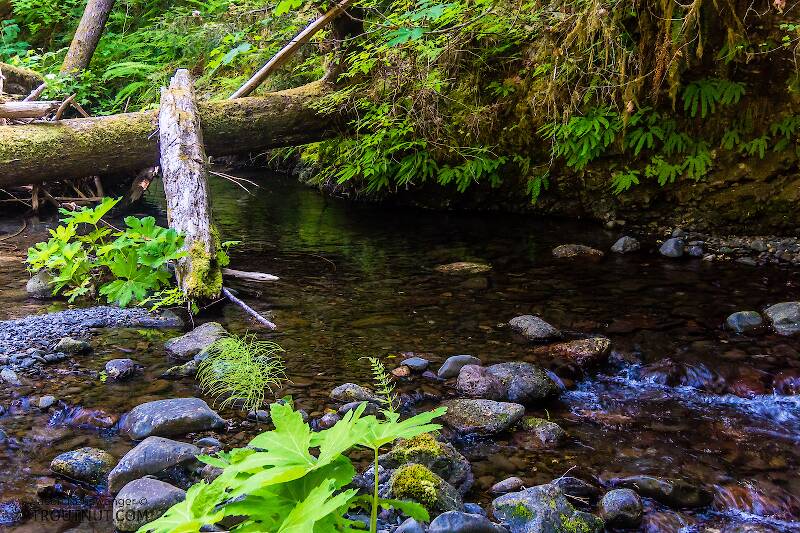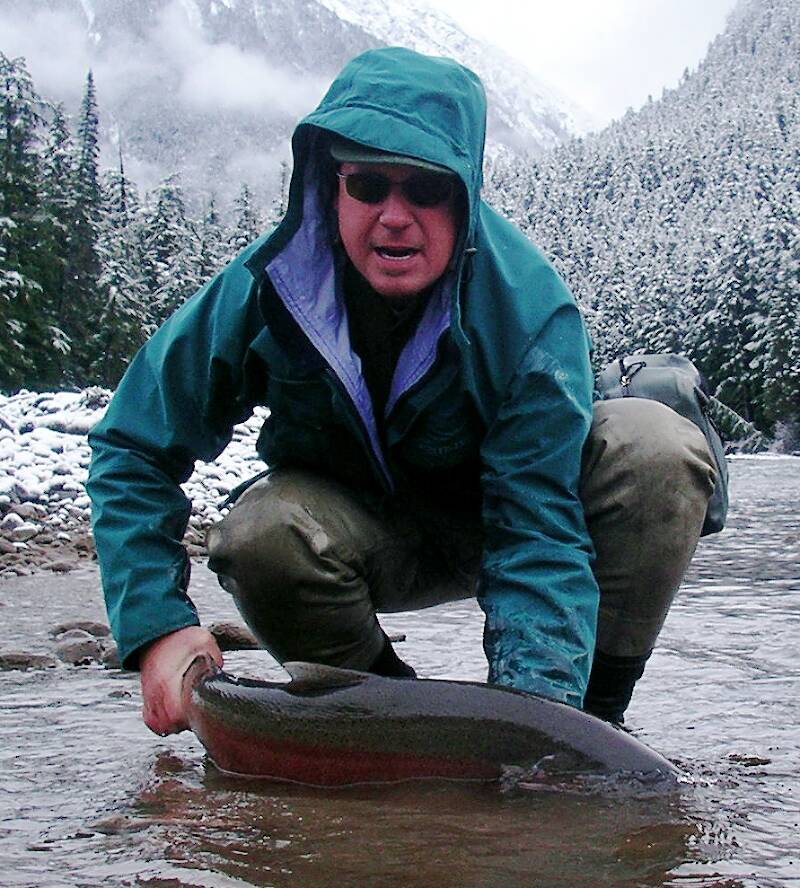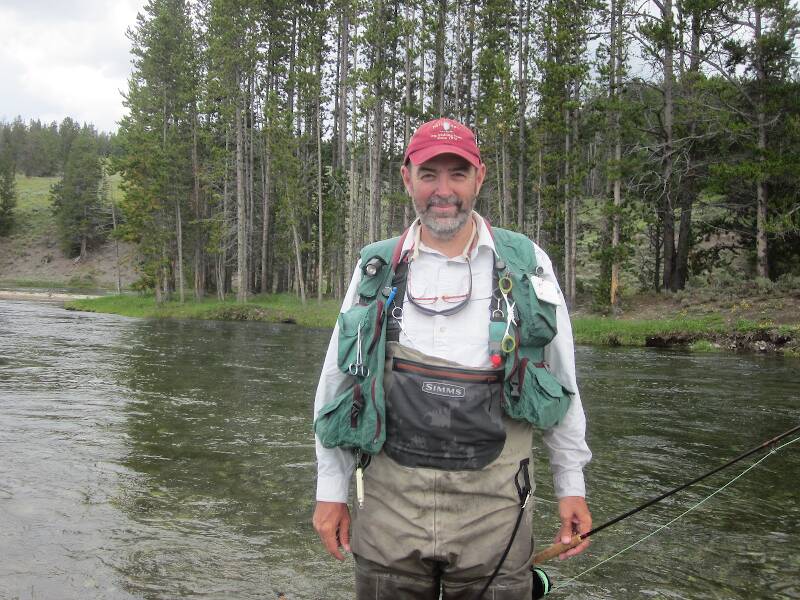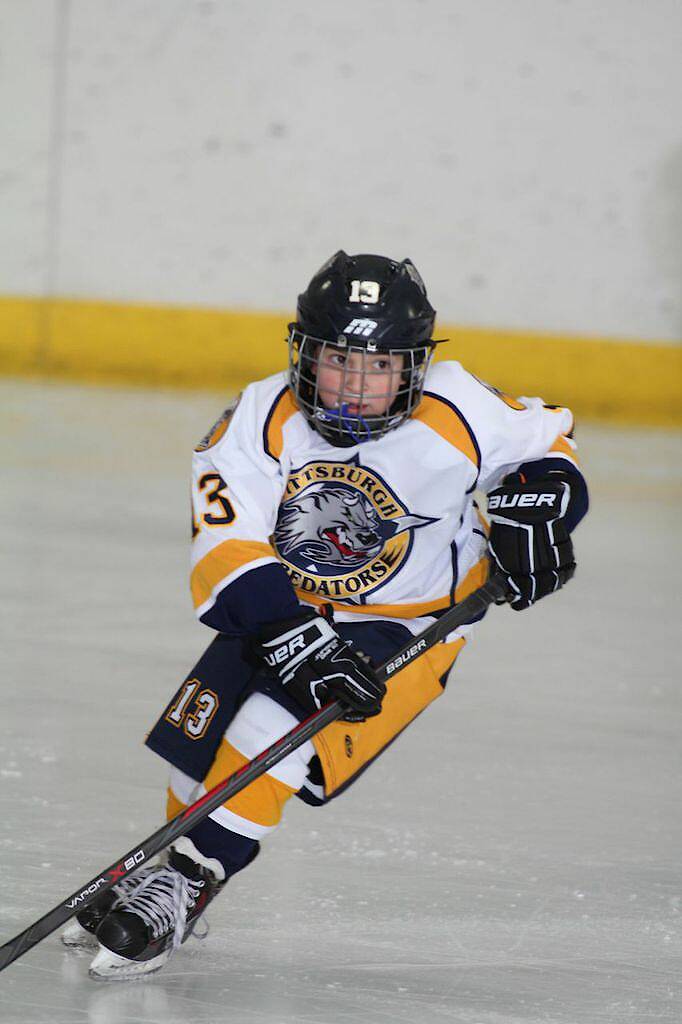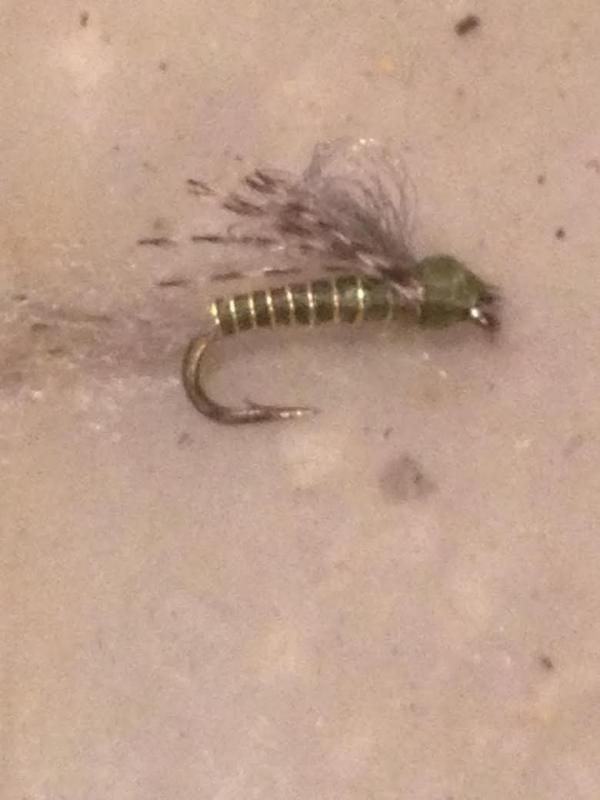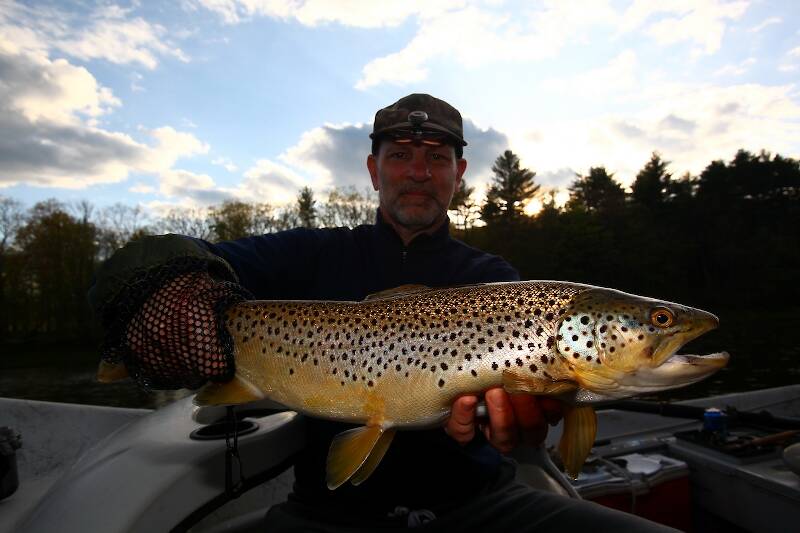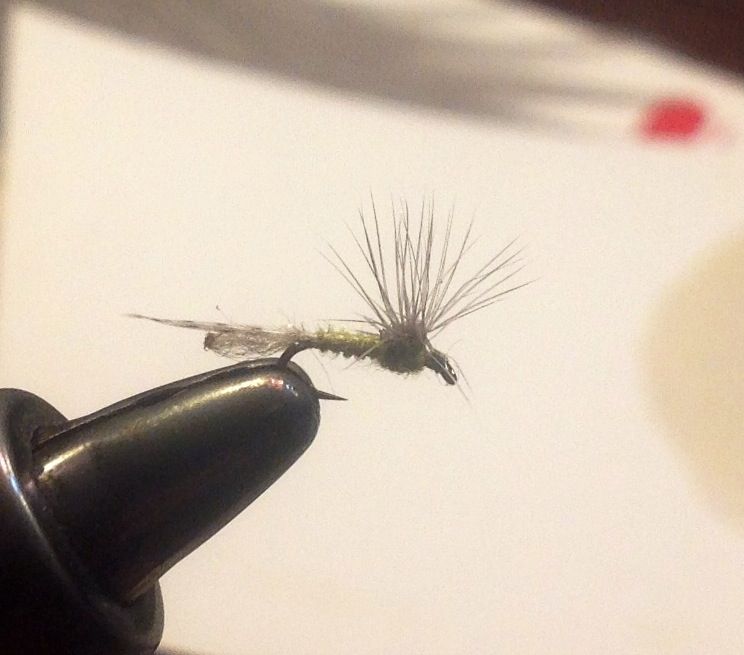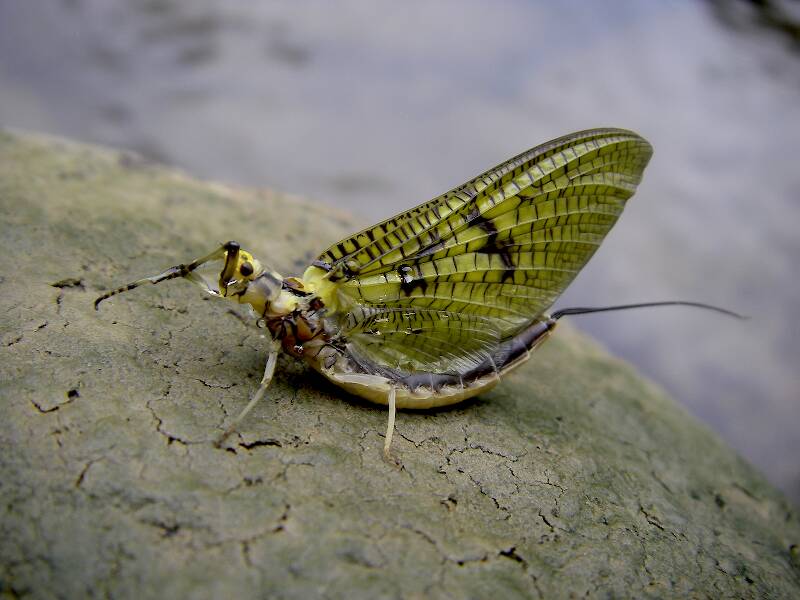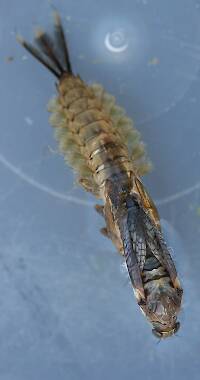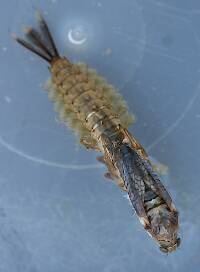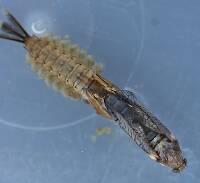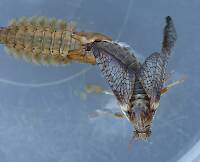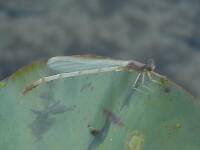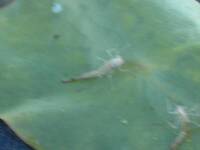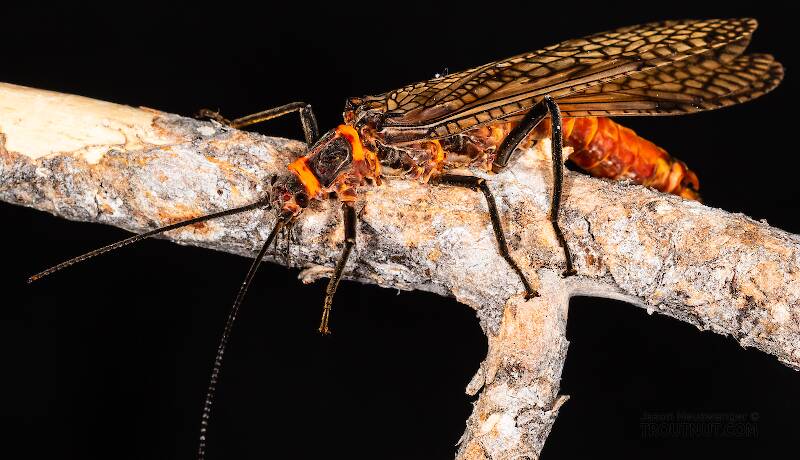
Salmonflies
Pteronarcys californica
The giant Salmonflies of the Western mountains are legendary for their proclivity to elicit consistent dry-fly action and ferocious strikes.
Featured on the forum
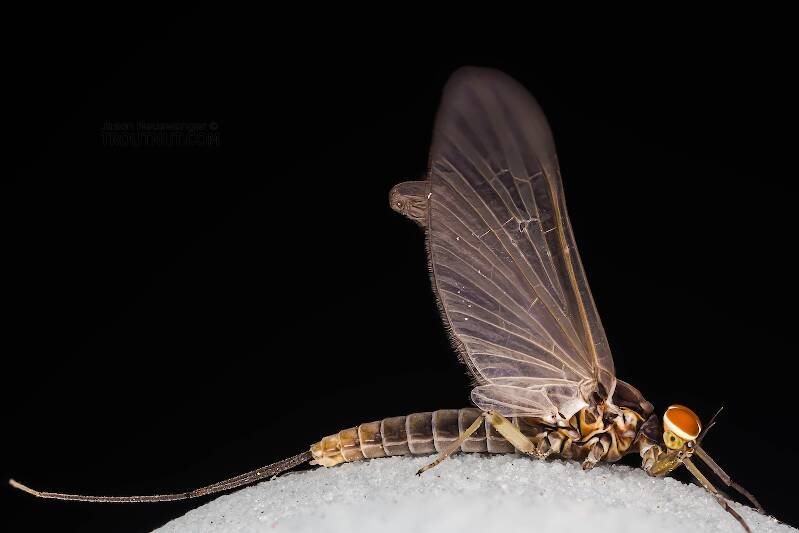
This dun emerged from a mature nymph on my desk. Unfortunately its wings didn't perfectly dry out.

Troutnut is a project started in 2003 by salmonid ecologist Jason "Troutnut" Neuswanger to help anglers and
fly tyers unabashedly embrace the entomological side of the sport. Learn more about Troutnut or
support the project for an enhanced experience here.
Baetis7 on Aug 20, 2014August 20th, 2014, 9:14 am EDT
I am fishing a small creek in the mid west and was curious to see what color nymphal shucks I should be using for size 18 to 22 baetis nymphs. Any suggestions or patterns would be helpful. Thanks!
Entoman on Aug 20, 2014August 20th, 2014, 10:38 am EDT
Welcome to the forum, Baetis7!
Neutral colors in pale gray or tan matches pretty well. Looked at closely the shucks are usually speckled so mixing in some sparse mallard flank has proven effective. Zylon in ginger works well in larger sizes, but for the tiny stuff (18 & smaller) finer Antron like Aunt Lydia's works better.
Neutral colors in pale gray or tan matches pretty well. Looked at closely the shucks are usually speckled so mixing in some sparse mallard flank has proven effective. Zylon in ginger works well in larger sizes, but for the tiny stuff (18 & smaller) finer Antron like Aunt Lydia's works better.
"It's not that I find fishing so important, it's just that I find all other endeavors of Man equally unimportant... And not nearly as much fun!" Robert Traver, Anatomy of a Fisherman
Baetis7 on Aug 20, 2014August 20th, 2014, 12:35 pm EDT
Thank you for that info...I will try and report back on the success!
Baetis7 on Aug 20, 2014August 20th, 2014, 12:46 pm EDT
I am seeing a good amount of what I believe to be psuedocloeons in the stream...about a size 22. What color would you recommend tying the abdomen and thorax of the emerger and/or nymph?
Oldredbarn on Aug 20, 2014August 20th, 2014, 2:40 pm EDT
I am seeing a good amount of what I believe to be psuedocloeons in the stream...about a size 22. What color would you recommend tying the abdomen and thorax of the emerger and/or nymph?
Iswaeon anoka was first brought to the attention of the angling community (as Pseudocloeon anoka) by famous angling author and columnist Joe Brooks. Back in the late 60's he wrote an article for Outdoor Life magazine extolling the work of Doug Swisher and Carl Richards in their forthcoming and groundbreaking book, Selective Trout. This species was featured as the model for their now famous version of the "No-Hackle" dry fly and imitative parachute patterns, sparking a revolution in fly design for hyper-selective trout. The rest as they say, is history...
In my humble opinion...Grass green Gordon Griffith 14/0 thread for abdomen...Or think light green/gray. Wing lightest dun...Also, if you are seeing our old Pseudocloeon anoka, now renamed (see above), you need to think size 24...:)
Spence
"Even when my best efforts fail it's a satisfying challenge, and that, after all, is the essence of fly fishing." -Chauncy Lively
"Envy not the man who lives beside the river, but the man the river flows through." Joseph T Heywood
"Envy not the man who lives beside the river, but the man the river flows through." Joseph T Heywood
Entoman on Aug 20, 2014August 20th, 2014, 9:59 pm EDT
You are right on the mark, Spence. Can't make those abdomens too thin. I like to rib with a lighter thread for segmentation and add a little more dubbing in the thorax area.
Your size recommendation too - Some of Jason's older photos show nymphs against a ruler that also have hooks shown for comparison. Something that glares out rather dramatically is how the proper hooks (based on shank length to body length) somehow often look too big. I've always seemed to have better luck going smaller when matching critters. Hmmm...
BTW - I'm the author of that quote. Don't want to pin that on Jason. Only one of us old farts could come up with trivia like that... :)
Your size recommendation too - Some of Jason's older photos show nymphs against a ruler that also have hooks shown for comparison. Something that glares out rather dramatically is how the proper hooks (based on shank length to body length) somehow often look too big. I've always seemed to have better luck going smaller when matching critters. Hmmm...
BTW - I'm the author of that quote. Don't want to pin that on Jason. Only one of us old farts could come up with trivia like that... :)
"It's not that I find fishing so important, it's just that I find all other endeavors of Man equally unimportant... And not nearly as much fun!" Robert Traver, Anatomy of a Fisherman
Baetis7 on Aug 21, 2014August 21st, 2014, 5:10 am EDT
You guys are awesome! I have been visiting this site for a number of years but just recently registered. Thank you for the great info and help! Do you have a favorite pattern? Not to give away your best success pattern of course but perhaps a sample picture to go on. Entoman, when you say that you like to use a lighter thread for the abdomen ribbing do you mean a darker olive for the abdomen with a light color say an off green or yellow for the ribbing. I have been currently using fine wire for the ribbing. Also, any way to post pics here....I have tied one up that I am looking forward to fish and would sincerely like your opinions. Thank you much!
Oldredbarn on Aug 21, 2014August 21st, 2014, 3:22 pm EDT
I'm going to go off the reservation here a bit and suggest you are overthinking the color issue. Hint of a tail, thread body, you can "jazz" up the thorax per Kurt, and the proper sized light dun hen...like a wet fly on a 24 size hook and you are in the neighborhood. :)
I have only met one person who could dub the body on this fly thin enough, and he fished with Swisher & Richards...If you can duplicate it, try dubbing...:)
Other option is to wrap rooster hackle and trim flat the fibers below the shank...I was up late one night drinking beers with Eric in Coburn PA after a wonderful afternoon on Penn's Creek, and he was tying and we laughingly argued about this short-cut...I saw him do it. :) Truth be known, and you can't tell this to Eric, but the same character mentioned above suggested the same thing to me, for this hatch, back in the early 90's...
"I grow old...I grow old...I shall wear my trousers rolled, and walk upon the beach...I have heard the mermaids singing each to each...I do not think they sing for me." probably misquoted T S Eliot :)
Spence
Experiment and purposely tie some with the wrong color, but correct size hook and see what happens...For science. :)
I have only met one person who could dub the body on this fly thin enough, and he fished with Swisher & Richards...If you can duplicate it, try dubbing...:)
Other option is to wrap rooster hackle and trim flat the fibers below the shank...I was up late one night drinking beers with Eric in Coburn PA after a wonderful afternoon on Penn's Creek, and he was tying and we laughingly argued about this short-cut...I saw him do it. :) Truth be known, and you can't tell this to Eric, but the same character mentioned above suggested the same thing to me, for this hatch, back in the early 90's...
"I grow old...I grow old...I shall wear my trousers rolled, and walk upon the beach...I have heard the mermaids singing each to each...I do not think they sing for me." probably misquoted T S Eliot :)
Spence
Experiment and purposely tie some with the wrong color, but correct size hook and see what happens...For science. :)
"Even when my best efforts fail it's a satisfying challenge, and that, after all, is the essence of fly fishing." -Chauncy Lively
"Envy not the man who lives beside the river, but the man the river flows through." Joseph T Heywood
"Envy not the man who lives beside the river, but the man the river flows through." Joseph T Heywood
Gutcutter on Aug 21, 2014August 21st, 2014, 5:26 pm EDT
All men who fish may in turn be divided into two parts: those who fish for trout and those who don't. Trout fishermen are a race apart: they are a dedicated crew- indolent, improvident, and quietly mad.
-Robert Traver, Trout Madness
-Robert Traver, Trout Madness
Entoman on Aug 21, 2014August 21st, 2014, 7:13 pm EDT
Now that's a fishy looking fly... Very nice, Tony.
B7 - The eastern anoka is uniquely colored. They are a little different from those that I fish but the concepts are the same. VERY sparse olive green dubbing ribbed with 10/0 cream thread seems to be the combo I use most often. I prefer beaver dubbing for its fine texture. Saddle hackle quill up near the tip works well also.
B7 - The eastern anoka is uniquely colored. They are a little different from those that I fish but the concepts are the same. VERY sparse olive green dubbing ribbed with 10/0 cream thread seems to be the combo I use most often. I prefer beaver dubbing for its fine texture. Saddle hackle quill up near the tip works well also.
"It's not that I find fishing so important, it's just that I find all other endeavors of Man equally unimportant... And not nearly as much fun!" Robert Traver, Anatomy of a Fisherman
Oldredbarn on Aug 21, 2014August 21st, 2014, 8:36 pm EDT
Hmmm...Interesting Tony...One of these days you are going to let me peek in those boxes of yours! :)
Spence
Spence
"Even when my best efforts fail it's a satisfying challenge, and that, after all, is the essence of fly fishing." -Chauncy Lively
"Envy not the man who lives beside the river, but the man the river flows through." Joseph T Heywood
"Envy not the man who lives beside the river, but the man the river flows through." Joseph T Heywood
Baetis7 on Aug 23, 2014August 23rd, 2014, 12:41 pm EDT
Martinlf on Aug 23, 2014August 23rd, 2014, 4:57 pm EDT
Oh, it will fish all right. Looks good.
"He spread them a yard and a half. 'And every one that got away is this big.'"
--Fred Chappell
--Fred Chappell
Entoman on Aug 23, 2014August 23rd, 2014, 11:52 pm EDT
"It's not that I find fishing so important, it's just that I find all other endeavors of Man equally unimportant... And not nearly as much fun!" Robert Traver, Anatomy of a Fisherman
Baetis7 on Aug 25, 2014August 25th, 2014, 6:01 am EDT
Gotcha! I used 6/0 waxed mono cord I believe...looking for some 8/0 and to maybe dub the body. Entoman that looks like a great emerger pattern. I caught a 14 inch rainbow yesterday on the above tied baetis emerger. It looks as though you would fish your bug in the surface film with the wing formation you have? I have been fishing mine fairly deep in the water column. Your pattern looks a bit more fishy to me and I like how you looped the trailing shuck. What are you using for your abdomen rib?
Entoman on Aug 25, 2014August 25th, 2014, 3:11 pm EDT
Hi B7,
Ah, that explains the bright look to the rib. My suspicion is that your pattern may be taken more for an emerging midge pupa. I'm using eggshell (pale cream) 8/0 unwaxed that makes for a more muted rib.
Yes, it is a surface fly, which is where you'll find baetids trailing their shucks. I like the Hackle Stacker because I can see it. Tony's is a better imitation of a stuck wing cripple, but I'd have trouble following it unless trailing behind another more visible dry. I'm hesitant to do so as that can raise problems with the drift. The two can fight with each other a little causing subtle micro drag on complex currents.
For just subsurface, I have a nymph pattern with a split wingcase that shows the shiny green shoulder of the dun showing through or a Sawyer PT derivative. For drowned cripples I've yet to come across anything that works any better than the English North Country Spiders - especially the Waterhen Bloa or Snipe & Purple. Believe me, I've tried! :)
I've written quite a bit over the years on fishing these little guys and posted photos of the patterns as well. I'll look for them and post some links...
Ah, that explains the bright look to the rib. My suspicion is that your pattern may be taken more for an emerging midge pupa. I'm using eggshell (pale cream) 8/0 unwaxed that makes for a more muted rib.
Yes, it is a surface fly, which is where you'll find baetids trailing their shucks. I like the Hackle Stacker because I can see it. Tony's is a better imitation of a stuck wing cripple, but I'd have trouble following it unless trailing behind another more visible dry. I'm hesitant to do so as that can raise problems with the drift. The two can fight with each other a little causing subtle micro drag on complex currents.
For just subsurface, I have a nymph pattern with a split wingcase that shows the shiny green shoulder of the dun showing through or a Sawyer PT derivative. For drowned cripples I've yet to come across anything that works any better than the English North Country Spiders - especially the Waterhen Bloa or Snipe & Purple. Believe me, I've tried! :)
I've written quite a bit over the years on fishing these little guys and posted photos of the patterns as well. I'll look for them and post some links...
"It's not that I find fishing so important, it's just that I find all other endeavors of Man equally unimportant... And not nearly as much fun!" Robert Traver, Anatomy of a Fisherman
Baetis7 on Aug 25, 2014August 25th, 2014, 5:22 pm EDT
Entoman, the ribbing was a gold fine wire which may be too loud IMHO. I will try a more subdued pattern here soon. So, baetiss do not shed their exoskeleton deeper in the water column? I was curious about this as I have been nymphing deeper with my emerger pattern and still having some success. I really enjoy nymphing and when I set my rig it requires some work and I'm not always quick to switch to dry fly or surface film bugs. I'm fishing anywhere from 3 to 6 ft of leader with tippet submerged in the water column and am finding some rather aggressive strikes on the baetis with shuck. I have tried fishing it near the surface and have not done that well for some reason. The local system has a good amount of baetis activity right now but am not noticing many fish taking duns. Also, the midge bite has been good all season and have uncovered some stones with a good amount of chironomids. I have matched these with out much success and have posted my pattern under a different thread on the Forum. Most of my aquatic bug courses with microscopy keying were just larvae and nymphs with out adults, emergers and pupae. Although I have observed these on the water I may be missing the boat here so to speak with productive angling technique. I do fairly well and am not a numbers guy and have been averaging a good amount of 10 to 14" fish which appears to be above the norm for the majority of local anglers as of late. This fishery is very flashy and sensitive with mostly small insects this time of year and some decent caddis and other larger mayflies but it is predominantly midges, bwo's and caddis that we encounter. I have caught one of my largest trout to date on a baetis pattern fished deep on this system and therefore am somewhat partial to this bug and the good response it has had. However, I am not an entomologist and enjoy the learning curve and educational ride and certainly enjoy learning from other fishy and buggy folks. Great Forum and thank you for the responses and sharing of knowledge!
Baetis7 on Aug 25, 2014August 25th, 2014, 5:25 pm EDT
Entoman on Aug 25, 2014August 25th, 2014, 9:41 pm EDT
Midges and most mayflies utilize grip on the surface tension to escape their nymphal shucks. Baetids are among the species that do this. While the success of your fly may be due to a good simulation of a drowned midge emerger the reality is that it may be due simply to attraction. I've long since given up on the notion that positive responses to our flies can always be explained by imitation of attributes of the natural. Fish just do what they do.:)
The flowing ribbon like appearance of midge larvae is very hard to imitate. While looking good to us, stiff imitations seldom do the trick.
The shuck on my fly (about a fourth of a single ply of Aunt Lydia) is melted not looped.
The flowing ribbon like appearance of midge larvae is very hard to imitate. While looking good to us, stiff imitations seldom do the trick.
The shuck on my fly (about a fourth of a single ply of Aunt Lydia) is melted not looped.
"It's not that I find fishing so important, it's just that I find all other endeavors of Man equally unimportant... And not nearly as much fun!" Robert Traver, Anatomy of a Fisherman
Crepuscular on Aug 26, 2014August 26th, 2014, 7:23 am EDT
Other option is to wrap rooster hackle and trim flat the fibers below the shank...I was up late one night drinking beers with Eric in Coburn PA after a wonderful afternoon on Penn's Creek, and he was tying and we laughingly argued about this short-cut...I saw him do it. :) Truth be known, and you can't tell this to Eric, but the same character mentioned above suggested the same thing to me, for this hatch, back in the early 90's...)
Here is the fly that Spence speaks of in a size 22 :
Antron shuck version:
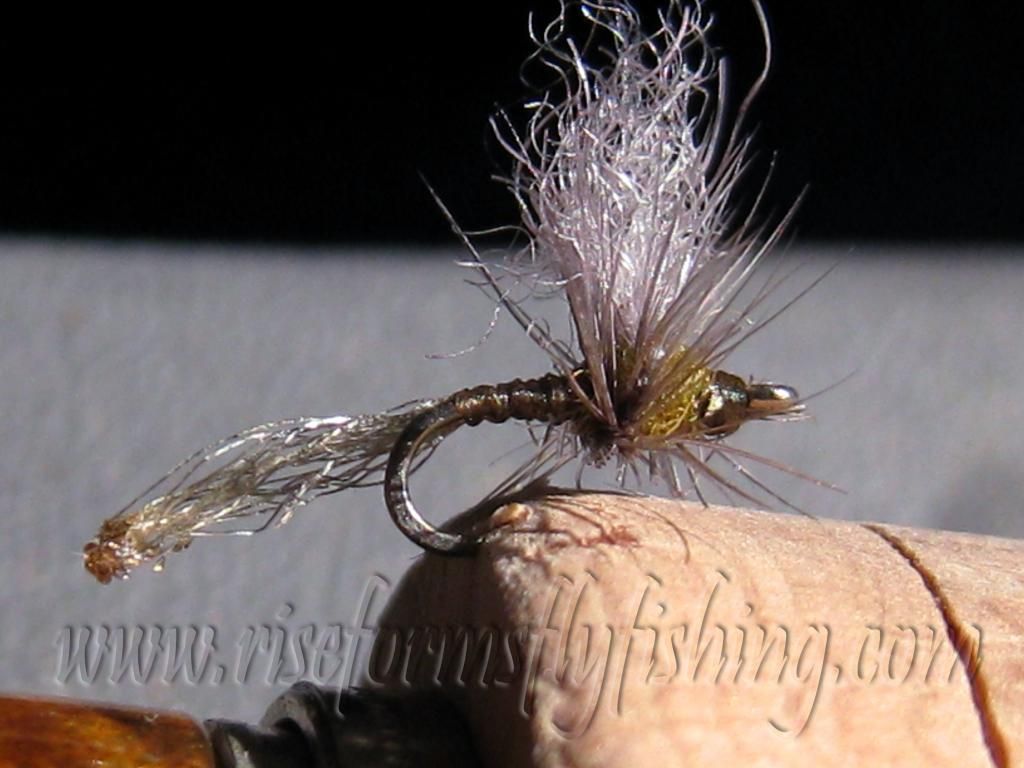
Marabou shuck version (I like this one the marabou has more movement in the water).
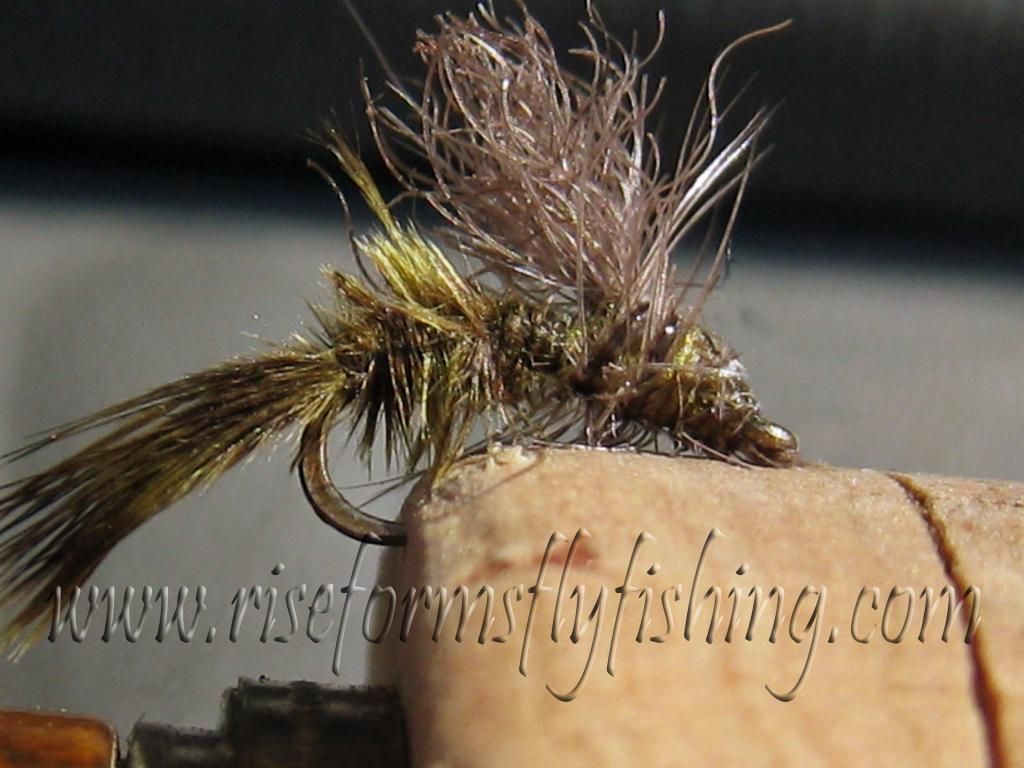
Quick Reply
Related Discussions
Topic
Replies
Last Reply
1
Sep 21, 2008
by GONZO
by GONZO
1
Mar 9, 2012
by Wiflyfisher
by Wiflyfisher
1
Jul 11, 2008
by Taxon
by Taxon

